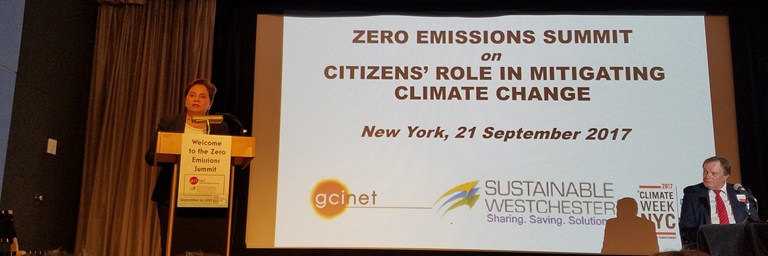Governments, businesses, and civil society organisations are stepping up efforts to encourage all citizens to reduce their greenhouse gas emissions and have launched a new network dubbed “I-CAN” to work together to promote climate neutrality.

As much as 70 percent of global consumption-based greenhouse gas emissions come from individual households. Launched on Zero Emissions Day in New York City, the initiative aims to mobilise citizens to decrease their carbon footprint by at least half over 10 years.
The goal can be achieved through measures ranging from reducing energy consumption at home, making use of low carbon transport, eating less meat and choosing low carbon products and services.
Patricia Espinosa, Executive Secretary of UN Climate Change, said that the initiative was crucial to achieve the key objective of climate neutrality.
Her words: “This new network can help everyone take action in their daily and professional lives. People, organisations, companies, and governments have realised is that climate neutrality isn’t only good for the planet, but good for their businesses and themselves,” she said.
Under the Paris Agreement, governments have agreed to shift the planet toward a pathway that keeps the maximum global average temperature rise to as close as possible to 1.5 degrees Celsius.
A balance must be achieved in the second half of this century between global emissions and removals in order to achieve this goal, and that is the essence of climate neutrality.
Participants at the I-CAN launch event in New York noted that 50 percent of the emissions can be attributed to the richest 10 percent of people around the world, who have average carbon footprints 11 times as high as the poorest half of the population.
With a key focus on North America, China, and India, the first milestone of the initiative is to get 100 million citizens take climate pledges by 2020.
The “Citizens Climate Pledge” initiative, under which citizens promise to reduce their emissions by half within 10 years and offset emissions they cannot avoid, has developed an online calculator which enables citizens to measure the precise amount carbon they are responsible for.
The launch event of I-CAN was organised by Sustainable Westchester Inc., Scandinavia House, and Global Crisis Information Network Inc., with the support of UN Climate Change, Stormwarning Association, and the Climate Leadership Council of Finland.
Sauli Niinistö, President of the Republic of Finland, said: “Citizens’ role is much more important than many think. I made my own Citizens Climate Pledge two years ago. My carbon footprint reduction campaign began already a few years before the pledge, when I had a geothermal heating system installed in our home. This cut our electricity consumption by about half. Since then we have switched to CO2-free electricity and are using more and more LED light bulbs. I have also paid more attention to reducing food wastage.”
Zoe Tcholak-Antitch, Mission 2020, on behalf of former UNFCCC Executive Secretary Christiana Figueres:“Bending the curve of emissions by 2020 is our best chance to limit global warming and ensure that the Sustainable Development Goals remain within our reach. It will also pave the way to delivering a just transition to net zero emissions by 2050. It’s necessary, it’s desirable and it’s achievable! This is the major opportunity to modernize our transport and energy, to clean our air, to create jobs, improve land use and have more livable cities.”
Petteri Taalas, Secretary-General, World Meteorological Organisation: “The warming has exceeded 1.1 C or 1.3 if the Arctic areas are taken into account. Economic losses have increased 50 fold since the 1950’s. The recent hurricanes have broken single event records and the trend continues.”
Kai Mykkänen, Minister of Foreign Trade and Development, Finland: “The government of Finland has taken an ambitious objective to exit using coal into energy and to halve the use of fossil oil by 2030. A week ago the Government of Finland released a report on Medium-term Climate Change Policy Plan 2030 – Towards Climate- Smart Day-to- Day Living. Finland aims to carbon neutrality by 2045. The plan contains a wide variety of actions to incentivize citizens in everyday life, especially in food, housing and mobility.”
Martin Chungong, Secretary General, Inter-Parliamentary Union: “IPU urges parliamentarians to lead by example. They can encourage others to take climate positive actions. Parliamentarians can work with their citizens and ensure that all communities understand well what can be achieved with current solutions and what still needs to be developed.”
Ben Banerjee, Swiss Impact Investment Association and EastWest Institute: “The amount of sustainable investments has grown rapidly and will soon be the mainstream. If your company is not aligned with Paris targets, you will have difficulties to get the money.”
Monsignor Tomasz Grysa, Permanent Observer Mission of the Holy See to the United Nations: “After publishing Laudato Si the Catholic Church many people will think that we cannot continue the way we live now. When we understand and accept this, the next thing is get people moving into right direction. Citizens Climate Pledge is a promising concept for it.”

Even though it will come as a cost but we do know who will benefit the most.We can only help reduce greenhouse gases but the money goes to some ones pocked far from Africa.